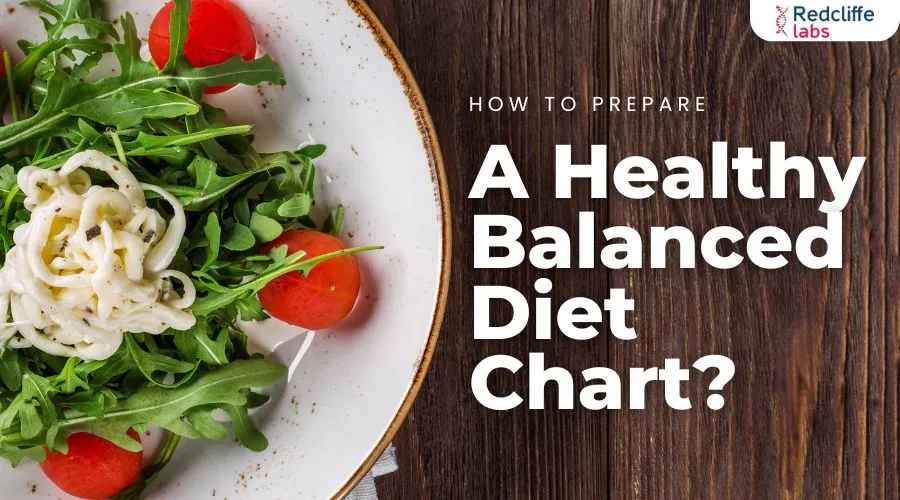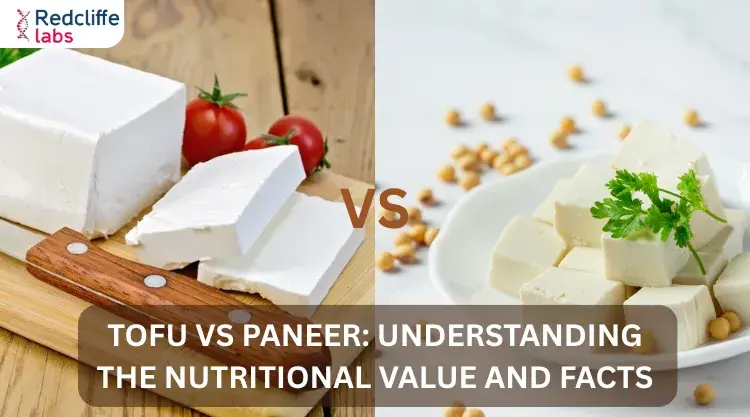How To Prepare A Healthy Balanced Diet Chart?

Medically Reviewed By
Dr. Geetanjali Gupta
Written By Muskan Taneja
on Nov 4, 2024
Last Edit Made By Muskan Taneja
on Jul 19, 2025

Food controls our daily functioning. Everything you eat in the day displays itself throughout the day. So, if you are feeling lethargic, you probably had a heavy meal in the morning, or if you feel drained, you probably had a light meal. So, what’s a balanced meal? How to have a healthy, balanced diet? In today’s blog, we will delve into the concept of a balanced diet chart. This diet chart provides energy for you to feel energized and sustain energy throughout the day.
Understand a Balanced Diet Chart & Its Components
A balanced diet chart is a well-planned meal consisting of essential nutrients. These nutrients allow energy for the body’s components to function properly.
Dieticians classify a balanced diet chart as a meal packed with proteins, healthy fats, vitamins, minerals, and other necessary nutrients.
Fruits and vegetables are important in forming a balanced diet. They strengthen bones, immunity, and digestion, preventing chronic health complications.
A balanced diet chart contains several components. These components aid in the overall well-being of the body. To prepare a balanced diet chart, you must understand its components.
Carbohydrates
Carbohydrates provide energy for day-to-day functioning. They make up around 50-60% of your diet. Choose healthy carbohydrate options such as whole grains, whole wheat, vegetables, fruits, legumes, and millet.
Proteins
Proteins help build muscles and maintain skin health. They are part of 10% of a balanced diet chart. Add eggs, lean meat, nuts, seeds, legumes, beans, seafood, and yogurt to complete your diet's protein content.
Fiber
Fiber foods help to maintain cholesterol and sugar levels in your body. Their management prevents the risk of cardiovascular diseases and keeps your heart healthy. Add beans, oats, whole grains, nuts, seeds, and brown rice for a high-fiber meal.
Vitamins
Our body needs 13 essential vitamins for proper functioning and growth. Fruits, vegetables, seeds, nuts, and poultry are good sources of vitamins.
Minerals
Minerals help the organs function properly. Iron, calcium, iodine, potassium, and sodium are some essential minerals. Fish, beans, cereals, nuts, seeds, and meat complete the mineral content.
Water
Dieticians consider water as an important component of healthy living. Drink plenty of fluids, necessarily 8 glasses of water a day.
Fats
Not all fats are bad for the body. Opt for healthy fats to maintain your body temperature and absorb vitamins. Avocados, nuts, seeds, fatty fish, and extra virgin oils are some sources of fats.

Also, read https://redcliffelabs.com/myhealth/food-and-nutrition/healthy-diet-chart-for-weight-loss/
A Well-Planned Diet Chart
Here is a well-planned, healthy, balanced diet chart for a healthy you. This can provide essential nutrients and prevent health complications like heart disease, liver disease, or kidney damage. However, before following the diet plan, ensure you are not allergic to any food items. Also, consult your dietician for confirmation.
|
Day |
Breakfast |
Lunch |
Mid-Meal |
Dinner |
|
Day 1 |
Poha + 1 glass of milk |
2 roti/chapati + mixed vegetable + raita |
1 plate full of fruits |
1 bowl of brown rice with daal |
|
Day 2 |
2 brown bread omelette + 1 glass of Milk |
1 bowl of brown rice with daal and veggies + salad |
Seeds and Nuts |
2 multigrain roti + daal with salad |
|
Day 3 |
Besan Chilla + 1 glass of Milk |
2 jowar roti with dal and veggies |
1 glass of Smoothie |
1 bowl of brown rice with daal + 1 plate of salad |
|
Day 4 |
Moong daal chilla + 1 glass of Milk |
1 bowl of brown rice + salmon fish curry or soya bean curry + salad |
Yogurt/ Greek yogurt |
2 roti + arhar ki dal |
|
Day 5 |
Namkeen dalia + 1 glass of Milk |
2 bajra roti + daal + veggies |
1 plate full of Fruits |
1 bowl brown rice + dal + salad |
|
Day 6 |
Veggies filled omelette + 1 glass of Milk |
1 bowl brown rice with paneer/chicken curry + salad |
1 glass of Smoothie |
2 multigrain roti + daal + curd |
|
Day 7 |
1 bowl of oats + 1 glass of Milk |
1 roti + dal + veggies + salad |
Seeds and Nuts |
1 bowl of brown rice with dal + green-leafy vegetable salad |
*Consult A Medical Professional Before Following*
7 Effective Benefits of Following A Balanced Diet Chart
A balanced diet chart provides several benefits for both an adult and a child. Following a balanced diet chart to lose weight helps in many ways. These are:
- Preventing malnutrition
- Maintain energy levels and normal body functioning
- Strengthening bones and muscles
- Boosting the immune system and creating a safe space for growth
- Support a healthy and safe pregnancy
- Prevent pregnancy complications
- Prevent the risk of health complications such as type 2 diabetes, cardiovascular diseases, and certain cancers.

Benefits of a balanced diet chart for adults
A balanced diet helps adults maintain physical and mental health, improving overall well-being and reducing the risks of diseases. By following a healthy, balanced diet, adults can live longer lives.
- A healthy diet filled with nutrients helps maintain a healthy body weight. The nutrients can curb excessive fats and calories.
- A nutrient-rich diet reduces the risk of health conditions such as CVDs, kidney failure, and type-2 diabetes.
- Adulthood is an age full of energy. Nutrients help nourish and provide the body with necessary energy resources.
- Fruits, vegetables, fiber-rich foods, and healthy fats support brain functioning, manage stress, regulate mood, and reduce chances of depression.
- A nutrition-rich diet aids digestion and regular bowel movements while supporting gut health.
- A healthy diet supports healthy hair. Omega-3 fatty acids, proteins, iron, vitamins, and minerals promote hair growth and thickness.
A balanced diet chart benefits adults and children. Although a balanced diet chat for children is not known or common, it helps with growth and development and prevents obesity and other health complications.
Also, read https://redcliffelabs.com/myhealth/food-and-nutrition/weight-loss-diet-chart-for-female/
Key Takeaways
Before preparing a healthy, balanced diet chart, make sure you consult a doctor and aren't allergic to any food. Prepare a balanced diet chart with carbohydrates, fats, proteins, vitamins, fiber, and minerals. Also, take control of your health with Redcliffe Labs by taking a preventive test. A full-body check-up can help detect any nutrient deficiency or underlying disease.
Leave a comment
1 Comments
yones sayes
Mar 16, 2025 at 2:08 AM.
thanks for advice
Myhealth Team
Mar 16, 2025 at 6:39 AM.
You're Welcome!



